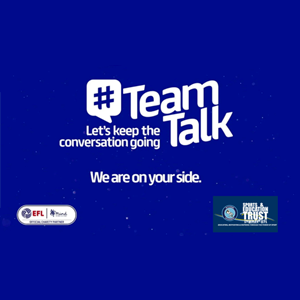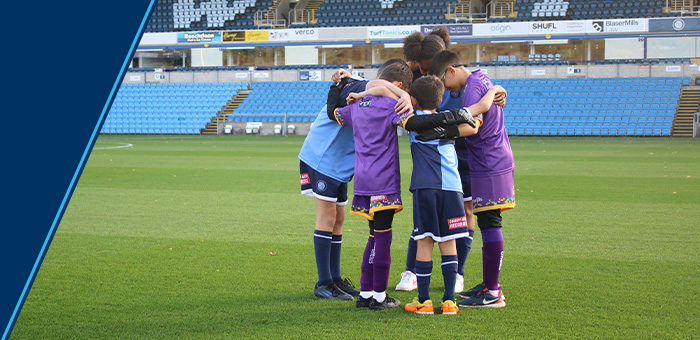In early Dec 2020 The EFL, in partnership with Mind, launched the Team Talk mental health campaign after a landmark 10-year mental health report found that:
· The number of men who have suicidal thoughts when feeling worried or low has doubled to one in ten.
· Two in five men admit to regularly feeling worried or low, an increase since 2009.
· Men are now almost three times more likely to see a therapist when worried or low than in 2009.
The ‘Team Talk’ campaign was designed with the aim of to urging supporters to talk and stay connected throughout the Christmas and January period and keep the conversation around mental health going.
New research into men’s mental health suggests that, while some progress has been made, men feel worried or low more regularly than ten years ago and are consequently twice as likely to feel suicidal.
The findings are part of ‘Get It Off Your Chest: Men’s mental health 10 years on’ – a report commissioned by Mind as part of its charity partnership with the League. The report compares new polling data from YouGov* with results from 2009 to understand how the challenges facing men’s mental health have changed over the past 10 years. The full report can be found here: https://www.mind.org.uk/media/6771/get-it-off-your-chest_a4_final.pdf
Results show that one of the top alternatives to medication includes social activity, which during the pandemic has been difficult for many people, especially football supporters with matches being behind closed doors. To help keep supporters connected to their Clubs, Team Talk sessions have been delivered nationwide during Dec 2020 and Jan 2021 to informally bring fans together (virtually or in-person where safe to do so) to talk about football – helping them stay connected during what can be a difficult time of year for many.
The sessions build on the excellent community work of Clubs throughout the pandemic which has included befriending phone calls, online social groups, pen-pal schemes, and socially distanced ‘garden gate’ conversations across EFL communities to reach the people who require this vital support right when they need it the most.
WWSET hosted our own Team Talk event on the 18th Jan over zoom, and following its delivery Head of Health Sam White said:
“It was great to get our previous FIT Fan Legends together to have a good catch up, play a game, and spend some time reconnecting with friends. We did a few zoom gatherings in the first lock down, which provided a fun and sociable environment for our Legends as we fully appreciate that lockdown has been tough on a lot of us and any way we are able to stay connected is vital.”
Rick Parry, EFL Chair, said:
“This period has been incredibly challenging for so many people, and we know football supporters have missed the camaraderie and sense of community that attending a live football match brings. Although we have welcomed supporters back to some matches in limited numbers, we know many people are still unable to attend and are missing watching their football team in-person with family and friends. EFL Clubs are the cornerstone of their communities and through the network of 72 Clubs, the EFL is in a unique position to reach millions of football fans who may be suffering in silence with their mental health. The Team Talk campaign builds on the excellent work of Clubs during the pandemic in helping some of the most vulnerable in society at such a critical time.”
Paul Farmer, Chief Executive of Mind, said:
“It’s really positive that men are more likely to seek help from the NHS and talk to friends and family about their mental health than they were 10 years ago. As a society, we have become more open about mental health in the last decade as campaigns such as Mind’s partnership with the English Football League (EFL) have helped to shift stigmatising attitudes and behaviours, and this may be beginning to filter through. Men still tell us that they are not always getting the help they need for their mental health. Sometimes they don’t know where to go for help or what’s on offer might not be suitable for them. Our survey suggests that a wider range of options might be needed, such as physical activity and social activities, alongside access to talking therapies and medication. Ultimately, men are still three times as likely to take their own life as women, so there is much more to do to ensure men can ask for help and can get the right support when they need it.”
WWSET received some lovely feedback from our Team Talk Session, which can be seen below:
· “I want to say a huge thank you to Sam for the well organised Team Talk last night. It was great fun and exactly what everybody needed. We were all relaxed and had lots of laughs playing Family Fortunes and were able to forget our problems. I am really looking forward to doing this again.”
· “This was just what I needed, seeing friendly faces, having a good laugh and forgetting everything going on around us. Well done Sam!”
· “Had a really good time on the Team Talk zoom tonight, have been struggling with different health problems, so was nice to see familiar faces. Hope we can do it again soon”
· “I really loved tonight’s session, although I didn’t really know many of the people it was really fun and really nice to speak to some other humans, being stuck in isolation I have been a nervous wreck so this was a real light relief.”
* All figures, unless otherwise stated, are from YouGov Plc. Total sample size was 2,111 adults. Fieldwork was undertaken between 10–11 September 2019. The survey was carried out online. The figures have been weighted and are representative of all GB adults (aged 18+).


